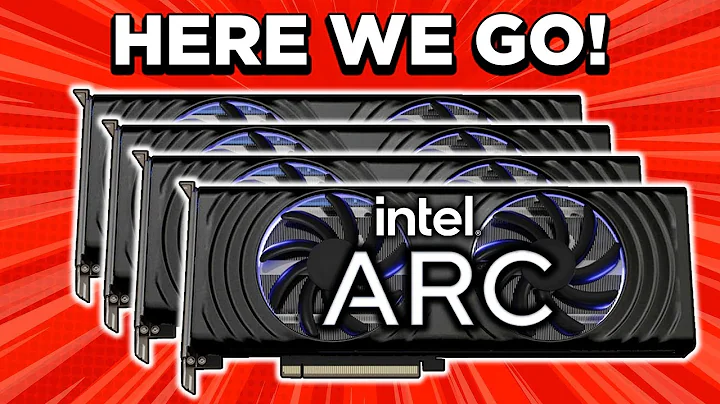Unveiling the Performance Difference: AMD 3900XT vs 3900X
Table of Contents
- Introduction
- AMD CPU Refresh
- testing Setup
- Cinebench Performance
- Temperature Analysis
- Performance in 7-Zip Benchmark
- Handbrake Test Results
- Blender Rendering Performance
- Gaming Performance: Total War Three Kingdoms
- Gaming Performance: CS:GO
- Gaming Performance: Formula 1
- Gaming Performance: Shadow of the Tomb Raider
- Gaming Performance: Doom Eternal
- Conclusion
- Should You Upgrade to the AMD Ryzen 3900XT?
Introduction
In this article, we will explore the recent refresh of AMD CPUs and specifically focus on the performance of the new Ryzen 3900XT. With slightly higher boost clocks compared to its predecessor, the Ryzen 3900X, many are curious to see if the new chip lives up to the hype. We conducted extensive testing on the Ryzen 3900XT, comparing it to the 3900X in various workloads, including synthetic benchmarks, creative tasks, and gaming. Join us as we delve into the results and determine if the improvements are truly significant.
AMD CPU Refresh
AMD has recently released a refresh of their existing CPU lineup, including the Ryzen 3900XT. While the highly anticipated Zen 3 architecture is still on the horizon, this release caters to early adopters who are currently using older AMD CPUs, such as the popular Ryzen 3000 series. The 3900XT is the last chip officially supported by these older motherboards, making it a viable upgrade option for those looking to enhance their system's performance without investing in a new motherboard. However, with Zen 3 right around the corner, some may question the value of this soon-to-be outdated architecture.
Testing Setup
Before diving into the performance analysis, let's take a moment to familiarize ourselves with the test bench used in our experiments. Our setup consisted of an open bench configuration with an ASUS B550 motherboard, 16GB of Corsair DDR4 RAM, an ASUS RTX 2080 Super graphics card, a Clevo NVMe SSD, and a Fractal Design Celsius Plus AIO cooler. We also conducted a few tests with the default cooler included with the Ryzen 3100XT to compare its thermal performance with the aftermarket cooler. Now that we have established the testing environment, let's move on to the results.
Cinebench Performance
Starting with synthetic benchmarks, we ran Cinebench R15 to gauge the performance of the Ryzen 3900XT compared to the 3900X. Surprisingly, both CPUs exhibited almost identical results, regardless of the cooling solution used. Although the single-core score saw a negligible increase, the multi-core score remained essentially the same. This suggests that the boost in clock speeds may not significantly impact performance in this benchmark.
Temperature Analysis
One area of concern when it comes to the Ryzen 3900XT is its heat dissipation. We conducted tests using both aftermarket coolers and the stock cooler that comes with the 3900X. The results were quite revealing. When running at stock settings, the 3900XT consistently reached higher temperatures, averaging around 4.3 degrees Celsius hotter than the 3900X. This temperature difference raises questions about the efficacy of the 3900XT's cooling solution and whether the slight improvement in performance justifies the increased heat output.
Factors Affecting Performance
Upon closer examination, we noticed that the 3900XT exhibited more frequent speed drops compared to the 3900X in certain workloads. This may indicate potential room for optimization and future improvements from AMD. Additionally, while the temperature difference decreased to just 3.4 degrees Celsius during multi-core tests, the 3900XT still ran hotter overall. Further investigation is needed to determine the cause of this temperature disparity.
Performance in 7-Zip Benchmark
Moving on to the 7-Zip benchmark, we once again observed underwhelming results. The scores between the two CPUs showed only a slight variance, particularly in decompression tasks, where the stock 3900X lagged behind by approximately 3%. While this difference is not significant, it indicates that the boosted clock speeds of the 3900XT may not Translate to substantial improvements in real-world performance.
Handbrake Test Results
We proceeded to test the performance of the Ryzen 3900XT and the 3900X using the Handbrake software. Initially, it seemed that the 3900XT was leading the pack. However, upon closer inspection, we discovered that the performance of the two CPUs was nearly identical. The slight advantage of the 3900XT was negligible when compared to the 3900X. The results remained consistent across various encoding settings, confirming that the marginal clock speed boost of the 3900XT does not significantly impact performance in this Scenario.
Blender Rendering Performance
We ran several Blender rendering tests using both the CPU and GPU to assess the performance of the Ryzen 3900XT and the 3900X. Surprisingly, the results were almost identical for both CPUs, regardless of whether the rendering was performed on the CPU or offloaded to the GPU. This outcome demonstrates that the boost clocks of the 3900XT do not provide a noticeable advantage over the 3900X in Blender rendering tasks.
Gaming Performance: Total War Three Kingdoms
To evaluate gaming performance, we conducted tests using various popular titles. In Total War Three Kingdoms, the overclocked Ryzen 3900XT exhibited a slight 3% advantage in average FPS compared to the 3900X. However, when examining the 1% lows, which are indicative of frame stability, both CPUs performed similarly. While there were minor variations, the differences in gaming performance between the two CPUs were relatively negligible.
Gaming Performance: CS:GO
Next, we turned our attention to CS:GO, a Game known for scaling well with high-performance CPUs. In this particular benchmark, the Ryzen 3900XT outperformed the 3900X by just over 3% in average FPS and approximately 2% in 1% lows. These marginal gains can be attributed to the slightly higher clock speeds of the 3900XT. However, the overall impact on gaming experience may not be substantial enough to warrant the additional cost of the newer chip.
Gaming Performance: Formula 1
Moving on to Formula 1, we found that the overclocked Ryzen 3900XT maintained a mere 2% advantage in average FPS over the 3900X. However, when analyzing the 1% lows, we witnessed a surprising outcome. The stock Ryzen 3900X outperformed the 3900XT, keeping frame rates approximately 1.6% higher. Even more unexpected was the performance of the Ryzen 3100XT, which ended up being outpaced by both higher-end CPUs.
Gaming Performance: Shadow of the Tomb Raider
In Shadow of the Tomb Raider, the differences in gaming performance between the Ryzen 3900XT and the 3900X were once again minimal, with variations of just a few percent across the board. This trend continued throughout our gaming tests, demonstrating that the small clock speed boost of the 3900XT does not equate to significant gains in frames per Second.
Gaming Performance: Doom Eternal
Lastly, we assessed the gaming performance of the CPUs in Doom Eternal. Surprisingly, both the Ryzen 3900X and the 3900XT delivered identical average FPS scores. However, when it came to stock settings, the 3900XT showed a significant 11% decrease in average FPS and a 7% decrease in 1% lows compared to the 3900X. We performed repeated tests to verify these results, but the disparity persisted. The cause of this substantial difference remains unclear and requires further investigation.
Conclusion
Based on our extensive testing, it is evident that the AMD Ryzen 3900XT offers only marginal improvements over its predecessor, the 3900X. The boost in clock speeds provided a slight increase in performance in certain synthetic benchmarks but failed to deliver significant gains in real-world applications, such as gaming and creative workloads. Furthermore, the 3900XT exhibited higher temperatures compared to the 3900X, raising concerns about its thermal capabilities. Considering the small performance delta and the premium price tag associated with the 3900XT, it may not be worth the investment for most users.
Should You Upgrade to the AMD Ryzen 3900XT?
Ultimately, the decision to upgrade to the Ryzen 3900XT should be evaluated based on individual needs and circumstances. For those building a new system and can afford to wait, it may be prudent to hold off until the release of Zen 3 CPUs. However, if immediate upgrades or system builds are necessary, the Ryzen 3100XT offers excellent performance at a more affordable price point. The 3900XT's slight advantage in certain benchmarks is unlikely to justify its higher cost, particularly if it remains unchanged or drops upon the Zen 3 release. It may be more beneficial to allocate those extra funds towards upgrading other components, such as a graphics card or storage solution.
Please note that the results presented in this article are based on our specific test setup and may not be representative of all systems and scenarios. Further research and consideration of individual requirements are advised before making any purchasing decisions.
Resources:
 WHY YOU SHOULD CHOOSE TOOLIFY
WHY YOU SHOULD CHOOSE TOOLIFY

























